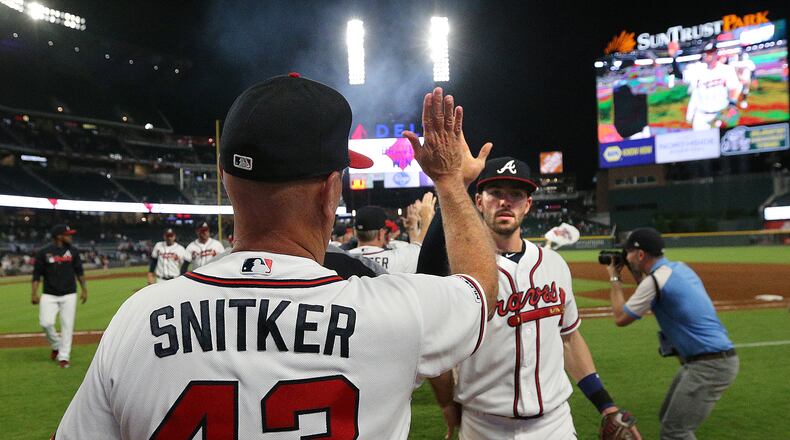When June dawned, the Braves were three games behind first-place Philadelphia. When July arrives, they’ll be leading the National League East. June was a good month for this club, but not such so good as to make us believe this club isn’t capable of better. Two Braves were voted All-Star starters; neither is having a year that represents an upward spike.
Freddie Freeman is the same as ever, which means he’s still great, but he has had seasons like this before. (That’s why he’s great.) Ronald Acuna’s numbers, good as they are, haven’t marked a jump over his rookie season. Not to put too fine a point on it, but that has been the story of the season: We expected the Braves to be good, and they are. They’ve begun to approach expectations. They haven’t exceeded them.
(I know, I know. Some folks figured the Braves would finish third or fourth. I wasn’t among that number. I never saw a reason this club wouldn’t repeat as division champs. Still don’t.)
Dansby Swanson’s power has been a surprise. His defense, however, has slipped. He’s down from last season in Ultimate Zone Rating and Defensive Runs Saved, which is no small thing if you’re a shortstop. Josh Donaldson has justified the Braves’ $23 million outlay, but he’s nowhere near the peak Donaldson of 2013 through 2016. Ozzie Albies needed a while to get going, but he is now. According to FanGraphs, the Braves’ catchers have been the NL’s fifth-best tandem; that’s where a slightly different tandem ranked last year.
Austin Riley’s first few weeks were astonishing, but pitchers have, as pitchers will, adjusted. As of Friday morning, Riley had batted .211 with an OPS of .714 in June; in May, he hit .356 with an OPS of 1.143. He’d struck out 34 times – against five walks and 20 hits – this month. Among big-leaguers with 150 plate appearances, his walks-to-strikeout rate is the sixth-worst. He’s also 22 years old.
The Braves had to cobble together a rotation to start the season – Mike Foltynewicz, Mike Soroka and Kevin Gausman began the year on the injured list – and they’re still cobbling. Julio Teheran and Max Fried have been better than expected. Soroka has been great. Foltynewicz was demoted to Gwinnett. Gausman would’ve been demoted if not for a convenient case of plantar fasciitis. As of Friday, the Braves’ starters had the fifth-worst ERA among the 15 NL staffs. The only way to win your division with such a number is if your division stinks.
Which the East just might. Washington just reached .500 for the first time since April 18. Philadelphia was a game over .500 when the week commenced. The Mets opened their Citi Field series against the Braves with the league’s third-worst record. For all the presumed upgrades of the other purported Eastern contenders over the winter, few have been made manifest. The Braves got away with an indifferent start and have built a working lead.
That said, we’re coming to the time when focuses change. The trade deadline is July 31. As it approaches, a good club must assume it will play beyond September. The Braves have addressed rotational gaps by signing Dallas Keuchel, who should fit the bill. He’s an innings-eater who throws strikes and induces ground balls. He’s not Clayton Kershaw in his prime, but neither is Clayton Kershaw anymore.
The NL East race isn’t over. The Phillies and Nationals will seek to paper over their flaws. Really, though, how many difference-makers are available? Keuchel and Craig Kimbrel have been claimed. Madison Bumgarner’s ERA is 4.21, which would mark a career worst. Jay Bruce has already been traded this season. (Jay Bruce is traded every season.) Now more than ever, sellers are looking to add prospects, which the Braves have been resolute in their refusal to sacrifice.
Every move from here on needs to be made with October in mind, which isn’t to say every move should be a blockbuster. Sometimes it’s the little trades that pay the biggest return: We reference the Braves’ addition of Anthony Swarzak, who stabilized a listing bullpen. Sometimes it’s the deals that aren’t made: A year ago, the Red Sox were pilloried for not fleshing out their relief corps, but those unassuming in-house arms were splendid in postseason. (It was the famous Kimbrel who wobbled.)
Looking ahead, what could the Braves use? Another reliever. Some good ones are apt to be available, three notable left-handers included. Will Smith of Newnan is the Giants’ closer; every contender will chase him. Lefties are hitting .153 and slugging .211 against Jake Diekman of Kansas City. Tony Watson, also of San Francisco, has lately been better against righties. All three will be in their 30s when October arrives. All are essentially on walkaway contracts.
Having signed Keuchel, it’s difficult to imagine the Braves springing for another starting pitcher. (Those will cost prospects.) They shouldn’t have need of a late-inning defender/base runner, Ender Inciarte having resumed “baseball activities.” Assuming Keuchel does the business, the Braves have enough to get them to the playoffs. A tweak or two could help them stick around once there.
The belief remains that the Braves have seized first place without reaching maximum capacity. That’s the tantalizing part. There’s reason to believe the best is yet to come. The best would be something to behold.
About the Author
The Latest
Featured



